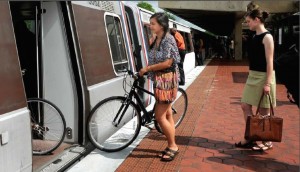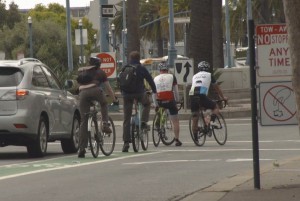Vehicle sales worldwide may be on fire, but for one day, imagine your life without a car, truck, crossover, sport-ute or minivan. That day could be today if you participate in World Car Free Day.
Drivers in more than 300 cities around the world today are encouraged to use any other mode of transport at their disposal to live their lives: trains, buses, bicycles, even walking are the preferred mode of transport today. In some cases, telecommuting is also a possibility, organizers suggest.
The idea is, for at least one day, to wean drivers off their vehicles with the hopes of getting those folks to make it more than just a one day event, but to trigger a significant change in driving habits.
“We do not want just one day of celebration and then a return to ‘normal’ life,” according to the World Carfree Network. “When people get out of their cars, they should stay out of their cars. It is up to us, it is up to our cities, and our governments to help create permanent change to benefit pedestrians, cyclists, and other people who do not drive cars.

If you saw this during your daily commute today, it may have been someone participating in World Car Free Day.
“Let World Car Free Day be a showcase for just how our cities might look like, feel like, and sound like without cars … 365 days a year.”
The movement is more prominent in some parts of the world than others with 330 cities hosting some form of the event. Not surprisingly, the U.S. isn’t necessarily a hotspot for participation. That said, there are active groups in places like Washington D.C. and New York City, although it had its Car Free Days in August.
However, the rest of the world appears to have taken to the concept with organized events in Australia, Europe, Asia and South America. In fact, Stockholm started with its car-free day on Saturday. Conveniently, Brussels has its car-free day last Sunday. Paris follows next Sunday, 27. It is usually Sundays. There are other European cities taking part: Madrid, Budapest, Wuerzburg, Oslo, Nottingham, Lisbon and Porto.
World Carfree Day was first organized back during the 1970s oil crisis and more days were organized in the 1990s in cities in Europe. The problem is, that most people don’t take notice at all or take part for one day then revert back to the old way.
(Stockholm to ban cars – for a day. For details, Click Here.)
However, there are many cities around the world looking to explore the car-free idea by eliminating or restricting the use of cars and trucks in city centers. The aforementioned Stockholm, which was joined by five other cities in Sweden for Car-Free Day, is examining how it can revolutionize the driving experience in concert with improving the environment.
To meet a target of reducing carbon dioxied and improve accessibility, Stockholm needs to consider a “new approach,” suggested Daniel Helldén, who heads up the city’s traffic division and is a member of Sweden’s powerful Green Party. “We have a new governance in Stockholm and we’re pushing the prioritization of walking, cycling and public transport hard.”
In fact, Stockholm recently took some criticism from a global study of urban environments for not going far enough to find alternatives to the car, noted The Local. On the other hand, that study named Malmö, on the southern end of Sweden, the world’s sixth most bike-friendly city.
(Click Here for details about Paris curtailing use of cars on city streets.)
One of the issues advocates of the car-free day in Stockholm hope to raise is that of vehicle ownership. In a separate interview, Helldén noted, “Most Stockholmers need a car at some point, but they shouldn’t have to keep one parked without it being used for a long period of time.”
Hamburg, for example, is weighing a plan that would ban the automobile entirely, while Helsinki might bar private vehicle ownership. That’s an issue that officials in the Finnish capital of Helsinki have begun to address. The city last August said it is studying a “truly transformative” plan that might bar private car ownership entirely, TheDetroitBureau.com reported, in favor of car sharing, bikes and public transport.
“The major innovation that (would make) this work will be an integrated payment system,” according to a study by Navigant Research that looked at the concept of offering Helsinki residents a universal transportation pass for a flat fee. “This part of the scheme may prove the most complicated to implement, but it is the final piece of the puzzle that makes this scheme truly transformative.”
(To see how privately owned cars could vanish under Helsinki plan, Click Here.)
Paris has implemented a program that limits the number of drivers who can drive within the city limits, cutting the number in half while also making public transportation free on those days. Even New York City is considering limiting access to certain streets to electric vehicles only.

